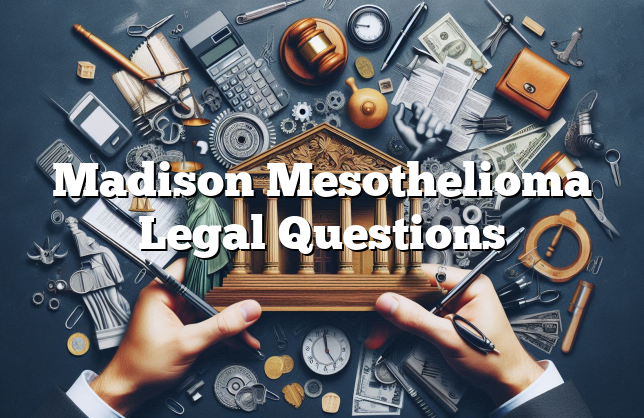Madison, with its rich history and industrial past, has seen a rise in mesothelioma cases, a rare and aggressive cancer caused by asbestos exposure. This guide seeks to address common legal questions surrounding mesothelioma diagnoses in Madison, providing clarity and guidance for victims and their families.
Understanding Asbestos Exposure in Madison
Madison’s industrial landscape, once dominated by manufacturing and construction, has left behind a legacy of asbestos contamination. Many older buildings, factories, and shipyards still harbor asbestos-containing materials, putting workers and residents at risk. Inhaling or ingesting these microscopic asbestos fibers can lead to devastating consequences, including mesothelioma, lung cancer, and asbestosis.
Important Madison Mesothelioma Legal Questions
1. What are the primary sources of asbestos exposure in Madison?
Madison’s industrial history has led to asbestos contamination in various settings. Older buildings with deteriorating insulation, shipyards, power plants, and manufacturing facilities are common sources of exposure. Even seemingly innocuous household items like textured paints, vinyl flooring, and certain appliances manufactured before the 1980s may contain asbestos.
2. Who can be held responsible for mesothelioma caused by asbestos exposure in Madison?
Determining liability for mesothelioma cases in Madison can be complex. It often involves identifying multiple parties who may have contributed to the exposure, such as manufacturers of asbestos-containing products, employers who failed to protect workers, property owners who neglected to address asbestos hazards, and suppliers who distributed asbestos materials.
3. What legal options are available to mesothelioma victims in Madison?
Individuals diagnosed with mesothelioma in Madison have several legal avenues to pursue. They can file personal injury lawsuits against negligent parties, seek compensation from asbestos trust funds established by bankrupt companies, or, if the exposure occurred in the workplace, file for workers’ compensation benefits.
4. How long do I have to file a mesothelioma lawsuit in Madison?
The statute of limitations for filing a mesothelioma lawsuit in Madison varies depending on the specific circumstances and the type of claim. It is crucial to consult with a legal professional as soon as possible after diagnosis to ensure you don’t miss any critical deadlines.
5. Can family members of mesothelioma victims also seek legal recourse?
Yes, in some cases, family members of mesothelioma victims may have legal standing to file claims. For instance, if a family member developed mesothelioma through secondary exposure from asbestos fibers brought home on a loved one’s clothing, they may be entitled to compensation.
6. How do I find a reputable mesothelioma lawyer in Madison?
Choosing the right legal representation is essential in mesothelioma cases. Look for attorneys who specialize in asbestos litigation, have a proven track record of success in handling mesothelioma cases, and are committed to fighting for the rights of their clients.
7. What types of compensation can I receive for my mesothelioma diagnosis in Madison?
The compensation awarded in mesothelioma cases can vary significantly depending on various factors, including the severity of the illness, medical expenses, lost wages, pain and suffering, and the degree of the defendant’s negligence.
8. Are there support groups or resources available for mesothelioma patients in Madison?
Yes, Madison offers several support groups and resources dedicated to assisting mesothelioma patients and their families. These organizations provide valuable information, emotional support, and guidance throughout the legal and medical journey.
9. What challenges might I face when pursuing a mesothelioma claim in Madison?
Mesothelioma litigation can be complex and challenging. Some common challenges include proving the link between asbestos exposure and the diagnosis, identifying all responsible parties, and gathering sufficient evidence to build a strong case.
10. What if the company responsible for my asbestos exposure no longer exists?
Even if the company responsible for your asbestos exposure is out of business, you may still have options for compensation. Many companies have established trust funds to compensate victims of asbestos exposure, and an experienced attorney can help you navigate these options.
11. What are the potential long-term health effects of asbestos exposure?
Asbestos exposure can have severe long-term consequences, including mesothelioma, lung cancer, and asbestosis. Regular medical check-ups are crucial for individuals with a history of exposure to monitor their health and detect any potential issues early on.
12. How can I protect myself and my loved ones from asbestos exposure in Madison?
To minimize the risk of asbestos exposure, be aware of potential sources in your home or workplace. If you suspect the presence of asbestos, consult with qualified professionals for testing and safe removal.
13. Are there regulations regarding asbestos abatement in Madison?
Yes, Madison has specific regulations governing the removal and disposal of asbestos-containing materials. These regulations aim to protect public health and ensure the safe handling of asbestos during abatement procedures.
14. What steps should I take if I discover asbestos in my home or workplace?
If you suspect the presence of asbestos, do not attempt to remove or disturb it yourself. Asbestos removal should only be performed by trained and certified professionals to avoid further contamination and exposure risks.
15. Where can I find more information about mesothelioma legal issues in Madison?
Several resources are available to provide information and assistance regarding mesothelioma legal issues in Madison. Consult with experienced attorneys, support groups, and government agencies specializing in asbestos regulations and victim advocacy.
Conclusion: Seeking Justice for Madison’s Mesothelioma Victims
The legal landscape surrounding mesothelioma in Madison is complex, but understanding your rights and seeking qualified legal counsel can make a significant difference in your pursuit of justice and compensation. By taking proactive steps to protect yourself and your loved ones, you can minimize the risks associated with asbestos exposure and advocate for your well-being.


